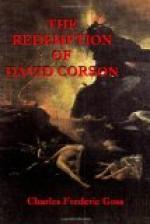The boy’s first feeling was one of chagrin at having his offer so proudly scorned; but his second was that of boundless pride at a feat so worthy of the hero whose praises they had just been sounding. “Hurrah!” he cried, bounding after her and flinging his hat into the air.
“Thee is as good a jumper as a man,” he exclaimed, regarding her with astonishment and admiration.
As they moved forward Nature wove her spells around them and they gave themselves utterly to her charms, pausing to look and listen, rapt in an ecstasy of communion and sympathy. Pepeeta’s familiarity with the flowers was greater than Steven’s, but she knew little about birds, and propounded many questions to the young naturalist whose knowledge of the inhabitants of field, forest and river seemed to be communicated by the objects themselves, rather than by human teachers.
“Hark! What is that bird, singing on the top of that tall stake?” she asked, pausing to listen, her hand lifted as if to invoke silence.
“That? Why, it’s a meadow lark,” said Steven.
“And there is another, ’way up in the top of that tall tree. Oh! how sweet and rich his song is. What is his name?”
“That’s a red bird, and if thee listens thee can hear a brown thrasher over there in the woods.”
They paused and drank in the rich music until each of these voices was silenced, and out of a copse of dense shade by the brookside there began to bubble a spring of melody so liquid, so clear, and withal of such beauty, that Pepeeta trembled with delight, hearing in that audible melody the unheard songs of the soul itself.
“What is it, Steven?” she asked in a whisper.
“Why, that is a cat bird! Doesn’t thee know a cat bird? I cannot remember when I did not know what that song was! It is such a crazy bird! It has only two tunes and is like our teacher at school. She either praises or else scolds us. And that is the way with the cat bird. It is either talking love to its mate, or else abusing it! I don’t like such people or such birds; I like those who have more tunes. Now thee has a lot of tunes, Pepeeta!”
This quaint reflection and delicate compliment broke the bird’s spell and made Pepeeta laugh,—a laugh as musical and sweet as the song of the bird itself. It passed through the fringe of trees along the river bank, rippled across it over against the smooth face of a cliff and came back sweetly on the spring air.
“Oh! did you hear the echo?” Pepeeta exclaimed.
“That is what I brought thee here for!” he said. “Uncle David taught me how to make it answer and told me what it was. It frightened me at first. Let us get close up to the water and listen!”
He took her by the hand and drew her along.
“Is it here that you are to tell me the secret?” she asked.
“Oh, no,” he said. “The echo tells its secrets! It is nothing but a blab any way. But I do not tell mine until the right time comes! Thee must wait.”




